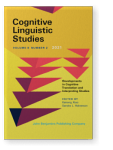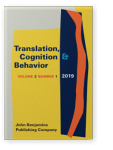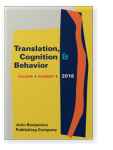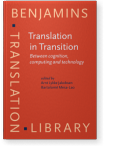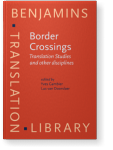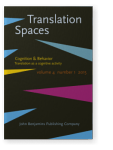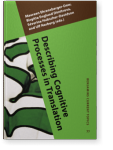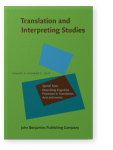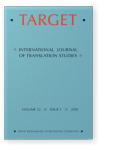Moritz J. Schaeffer
List of John Benjamins publications for which Moritz J. Schaeffer plays a role.
2021 Towards a methodological toolset for the psycholinguistics of translation: The case of priming paradigms Developments in Cognitive Translation and Interpreting Studies, Xiao, Kairong and Sandra L. Halverson (eds.), pp. 440–461 | Article
The manuscript provides readers with a basic methodological toolset for experimental psycholinguistic studies on translation. Following a description of key methodological concepts and the rationale behind experimental designs in psycholinguistics, we discuss experimental paradigms adopted from… read more
2019 ‘Monitoring’ in translation: The role of visual feedback Translation, Cognition & Behavior 2:1, pp. 1–34 | Article
We assume that visual feedback from the written trace during translation plays an important role in monitoring the emerging translation. In this study, 44 participants translated with and without visual feedback from the target text (TT). Numerous measures were used to explore the differences… read more
2018 The development of the TPR-DB as Grounded Theory Method Translation, Cognition & Behavior 1:1, pp. 168–193 | Article
Initial versions of the translation process research database (TPR-DB), were released around 2011 in an attempt to integrate translation process data from several until then individually collected and scattered translation research projects. While the earlier individual studies had a clear focus… read more
2017 Chapter 3. Measuring translation literality Translation in Transition: Between cognition, computing and technology, Jakobsen, Arnt Lykke and Bartolomé Mesa-Lao (eds.), pp. 81–105 | Chapter
Tirkkonen-Condit (2005: 407–408) argues that “It looks as if literal translation is [the result of] a default rendering procedure”. As a corollary, more literal translations should be easier to process, and less literal ones should be associated with more cognitive effort. In order to assess this… read more
2017 Chapter 1. Reading for translation Translation in Transition: Between cognition, computing and technology, Jakobsen, Arnt Lykke and Bartolomé Mesa-Lao (eds.), pp. 17–53 | Chapter
This chapter describes an eye tracking study which compared eye movements during reading for comprehension with reading for translation. In addition, the number of target words likely to be used for the translation of a single source word was manipulated. Results showed large significant task… read more
2016 Computational linguistics and translation studies: Methods and models Border Crossings: Translation Studies and other disciplines, Gambier, Yves and Luc van Doorslaer (eds.), pp. 225–244 | Article
Translation process research is an active interdisciplinary research area within
translation studies attracting translation scholars, computer scientists and the
machine learning community alike. Novel data acquisition methods have been
developed in recent years leading to large sets of translation… read more
2015 The role of syntactic variation in translation and post-editing Translation as a cognitive activity, Alves, Fabio, Amparo Hurtado Albir and Isabel Lacruz (eds.), pp. 119–144 | Article
2015 Shared representations and the translation process: A recursive model Describing Cognitive Processes in Translation: Acts and events, Ehrensberger-Dow, Maureen, Birgitta Englund Dimitrova, Séverine Hubscher-Davidson and Ulf Norberg (eds.), pp. 21–42 | Article
The purpose of the present chapter is to investigate automated processing during translation. We provide evidence from a translation priming study which suggests that translation involves activation of shared lexico-semantic and syntactical representations, i.e., the activation of features of both… read more
2013 Shared representations and the translation process: A recursive model Describing Cognitive Processes in Translation: Acts and events, Ehrensberger-Dow, Maureen, Birgitta Englund Dimitrova, Séverine Hubscher-Davidson and Ulf Norberg (eds.), pp. 169–190 | Article
The purpose of the present paper is to investigate automated processing during translation. We provide evidence from a translation priming study which suggests that translation involves activation of shared lexico-semantic and syntactical representations, i.e., the activation of features of both… read more
2010 Chamizo-Domínguez, Pedro José. 2008. Semantics and Pragmatics of False Friends Target 22:1, pp. 113–119 | Review
